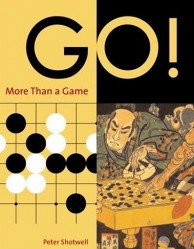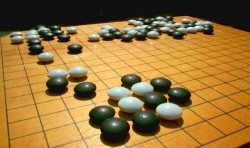 Go! More than a Game, by Peter Shotwell
Go! More than a Game, by Peter Shotwell
Reviewed by Harold Henkel, Associate Librarian
When two tigers fight, what is left is
one dead tiger and one wounded one.
-Chinese Proverb
Go is widely understood to occupy the position in China, Japan, and Korea that chess does in the West. Like chess, Go is a strategic board game whose origins and language lay in warfare. In every other aspect, however, the two games could hardly be more different, and while it is widely appreciated that some understanding and experience with Go can provide insights into East Asian philosophy and psychology, the game’s reputation for complexity stands as an obstacle for many potential players in the West.
To give a thumbnail comparison of the two games, while the object of chess is to checkmate the opponent’s king, the object of Go is to control more territory on the board. Chess is a game of aggression and domination; winning usually requires the destruction of the opposing army. Go is a game of patience and balance. Chess is about calculation; Go is about judgment. Winning consists not in destroying one’s opponent, but in achieving a comparative advantage. Above all, chess is principally a game of tactics, Go of strategy.
 Go, it must be admitted, is not an easy game to begin playing, but with a little effort, it is not at all impossible for adults to learn and enjoy. (As with so much else, children pick up the game much faster.) There are a number of helpful books for beginners, but I would recommend starting off with an excellent two-part introduction to the game on YouTube. After viewing these tutorials, take a look at the Wikipedia article before moving on to a Go: More than a Game. You should read no more than the first two chapters, before starting to play (I forgot to mention you need to find a partner for this project!) as you read more of the book. It is only by playing the game that you will start to “see” the strategic concepts of Go.
Go, it must be admitted, is not an easy game to begin playing, but with a little effort, it is not at all impossible for adults to learn and enjoy. (As with so much else, children pick up the game much faster.) There are a number of helpful books for beginners, but I would recommend starting off with an excellent two-part introduction to the game on YouTube. After viewing these tutorials, take a look at the Wikipedia article before moving on to a Go: More than a Game. You should read no more than the first two chapters, before starting to play (I forgot to mention you need to find a partner for this project!) as you read more of the book. It is only by playing the game that you will start to “see” the strategic concepts of Go.
Go: More than a Game is a clear textbook of Go that will take new players from beginning to intermediate proficiency. The author, Peter Shotwell, is an expert on the relationship of Go to Eastern and Western philosophy, literature, and history; and nearly a quarter of the book is taken up with those subjects, as well as how the game has affected the mentality and outlook of its players. For example, in explaining the influence of the game on Japanese business culture, Shotwell writes, “Japanese executives learned to look at the national and international corporate worlds as Go boards and designed many of their strategies accordingly…One should try to win, but that had to involve allowing the opponent to win something too, because all-out fights might destroy both competitors.” Readers with some background in mathematics, as well as film goers who saw A Beautiful Mind, where a lost Go match at Princeton ultimately leads to John Nash’s discovery of the Nash Equilibrium, will also be interested in the discussion of Go and game theory.